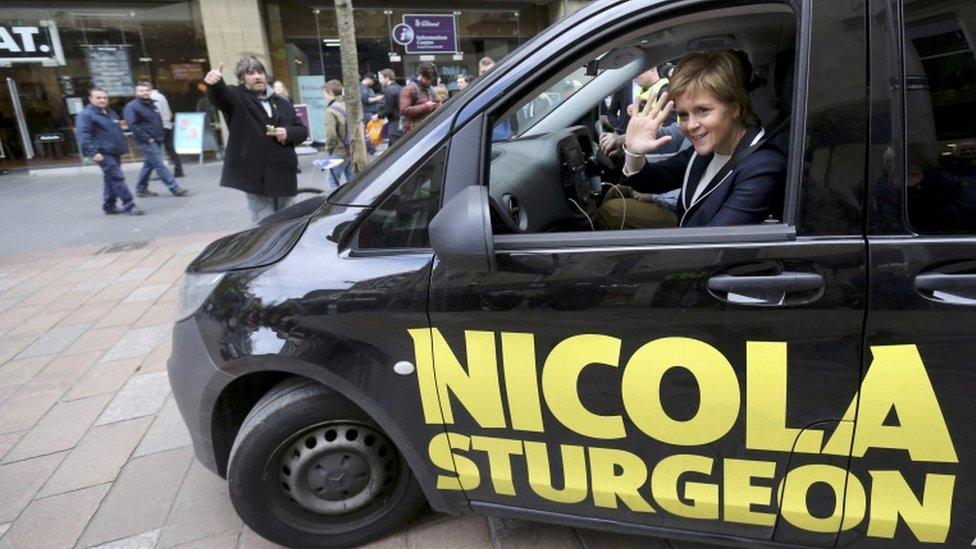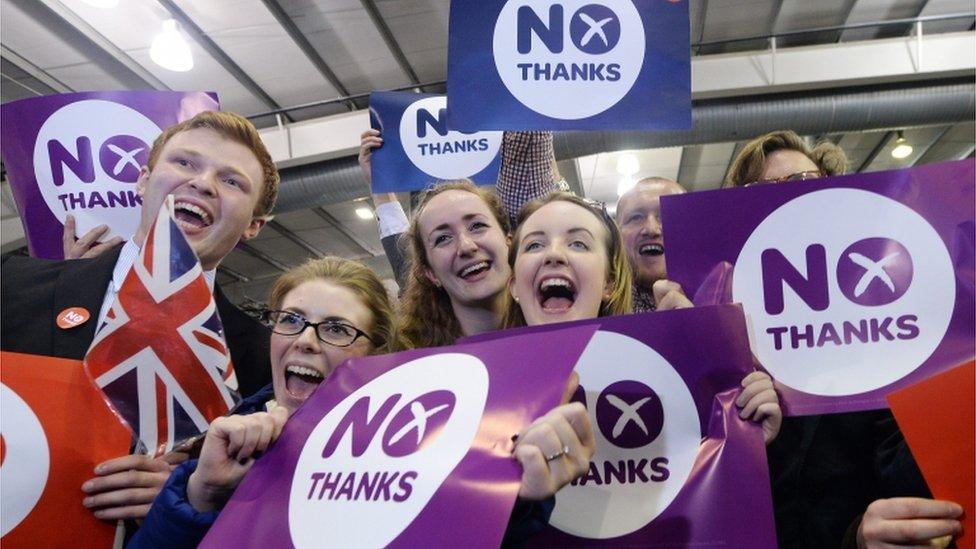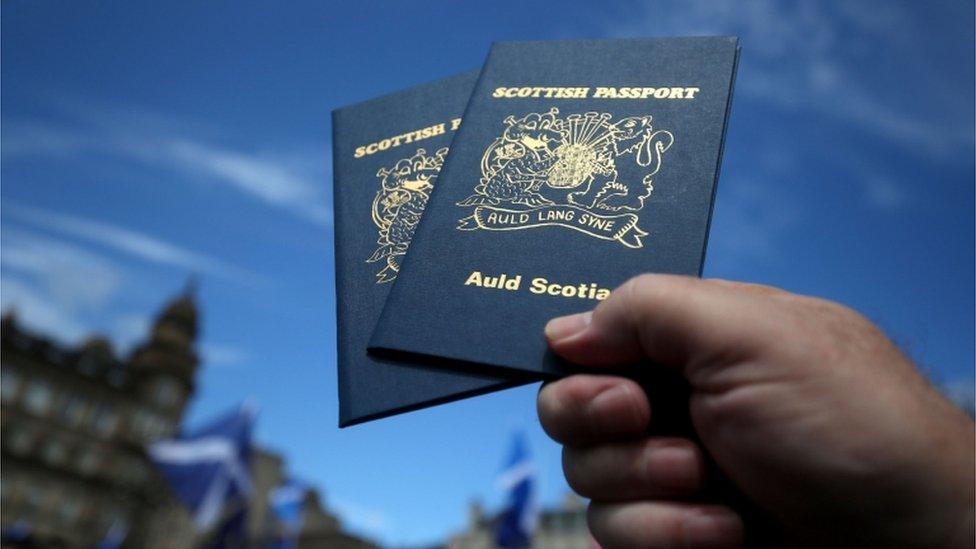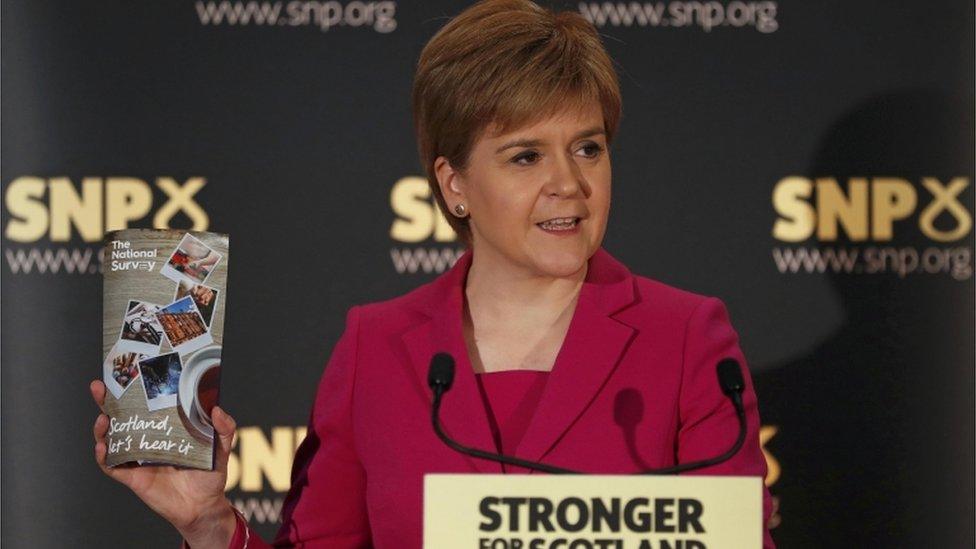Scottish independence: What is the size of the task facing Sturgeon?
- Published

According to the First Minister, Nicola Sturgeon, it is "highly likely" that a second referendum on Scottish independence will be held sooner rather than later, following the UK-wide decision to vote to leave the EU contrary to the preference of most Scots.
That statement means the launch today by the SNP of a somewhat delayed "summer offensive" on independence, an offensive that was initially promised as long ago as last March, has gained an added importance.
It is now potentially a launch pad for a second attempt to persuade a majority of Scots to vote for independence.
One of the implicit assumptions behind Nicola Sturgeon's "highly likely" remark is that enough of those who voted No to independence two years ago are sufficiently unhappy about the prospect of Scotland being required to leave the EU that they would now vote Yes.
But it is far from clear that there has been a post-Brexit increase in support for independence.
Referendum question
Since 23 June five polls have asked people how they would vote now in response to the question that appeared on the September 2014 ballot, "Should Scotland be an independent country?".
Three of these polls were conducted in the immediate wake of the Brexit vote. All three showed a small, but potentially crucial, swing to Yes.
Two were conducted by Survation. In one case 54% said they would vote Yes (after Don't Knows were left to one side), while in the other 53% did so.
When earlier this year Survation had on a number of occasions posed the referendum question, a little less than half - between 47% and 49% - then said they would vote for independence.

The No campaign won 55% of the votes in the 2014 independence referendum
The third poll to be conducted soon after 23 June was done by Panelbase. It reported that 52% now backed independence. In polls the company conducted earlier this year it had consistently put support at 47%.
In short, all three of these immediate post-EU referendum polls suggested the Brexit vote had stimulated a small but potentially decisive swing in favour of independence.
Instead of there still being a small majority in favour of remaining in the UK, as most polls had suggested was the case hitherto, there now appeared to be a small majority in favour of independence.
Realistic prospect
If those poll figures were right, there was some realistic prospect that the SNP could win a second referendum, albeit holding such a ballot would still represent a considerable risk for the first minister.
However, two more recent polls, taken after the dust of the EU referendum had settled somewhat, have painted a different picture.
Conducted by YouGov, these polls have found little or no evidence of a swing in favour of independence.
One taken at the end of July put support for independence at 47%, while a second undertaken at the end of last month and published today, puts the figure at 46%.
These figures are more or less exactly in line with four polls YouGov conducted in advance of the Scottish Parliament election in May, all of which put support for independence at 45%-46%.
If these polls are correct then, whatever might have been the immediate reaction to the result of the EU referendum, it appears that over the longer term the outcome has failed to change the balance of opinion on independence after all.

Polls have suggested the No voters have a stronger commitment to the UK than to the EU
Doubtless the first minister will be looking anxiously to see if any further polls in the coming weeks confirm YouGov's picture.
But at present it looks as though she cannot presume that she will be in a position to hold a successful second independence referendum any time soon.
Consequently, she needs the "summer offensive" being launched today to succeed in persuading more voters of the merits of independence.
To do that, the offensive will need to do more than reiterate the arguments in favour of Scotland staying in the EU.
YouGov's poll in July found that only 18% of those who voted No in the September 2014 referendum said they would rather live in a Scotland that was in the EU but not part of the UK than in a Scotland that was part of the UK but was outside the EU.
Economic case
This suggests that most No voters have a stronger commitment to the Union with the rest of the UK than to the European Union headquartered in Brussels.
The SNP need to focus instead on persuading more voters that the case for independence makes economic sense.
In March this year - when the SNP envisaged Scotland would have become independent if it had voted Yes two years ago - as many as 49% said that they thought Scotland would now be worse off financially if it had voted for independence. Just 22% thought it would be better off.
Crucially, amongst those who voted No in September 2014 only 5% felt the country would now be better off, while as many as 81% reckoned it would be worse off.
The SNP's failure so far to persuade most voters of the economic case for independence is underlined by today's YouGov poll, which finds that as many as 49% believe that Scotland benefits economically from being part of the UK, while just 23% believes being part of the UK is harmful.
Whatever voters feel about the rights and wrongs of the vote on Brexit, persuading a majority of them to vote for independence is always likely to be an uphill task for so long as so many of them are doubtful that the proposition makes economic sense.
- Published2 September 2016
